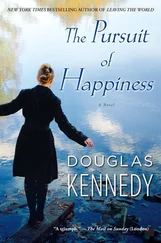'Are you yourself on any medication?' she asked me.
'Yes', I said.
'What kind exactly?'
I told her.
'And might you have breastfed your son before the stipulated eight hours?'
I could feel Tony's stare on me. Had somebody handed me a gun right now, I would have happily blown away the top of my head.
'Jack woke me up out of a heavy sleep', I said, 'and I was so fogged, I didn't think...'
'Oh, for God's sake', Tony said. 'Where is your brain?'
The doctor slightly touched Tony's sleeve; a hint that he should stop. Then she said, 'Believe me, it happens all the time. Especially with very tired new mothers'.
'But will he be all right?' Tony asked.
'What time did you take the pills?' the doctor asked me.
'Don't know'.
'What do you mean, you don't know', Tony said, the anger now showing.
'Middle of the night, I think'.
'You think?' Tony said.
'May I handle this, please?' the doctor asked, then turned, put her hand on my arm, and addressed me directly.
'Now you mustn't get upset about what's happened'.
'I've killed him', I heard myself saying.
'No, you have not', she said, her voice firm. 'Now tell me' -
'I threatened to kill him, now' -
She gripped my arm tightly.
'Just please tell me... you took the pills around, what, five, six this morning?'
'I suppose...'
'And then he woke you up and you fed him...?'
'Don't know... but it was still dark'.
'That's good. And who found him in this state?'
'Me', Tony said, 'around nine this morning'.
'Which was probably around three to four hours after you fed him?'
'I guess so'.
She turned to the nurse and spoke in a low voice, issuing instructions.
'Is he going to be all right?' Tony asked.
'I think so. I've asked the nurse to put your son on a saline drip to keep him hydrated - and we'll also keep him on a heart monitor, just to be absolutely sure that everything is fine. But, from my experience of this situation, the baby simply has to sleep the medicine off'.
'But will there be any long term damage?' Tony asked.
'I doubt it. The fact is, the dosage of the drug he received in the breast milk was so nominal that...'
That was the moment that my knees gave way and I hung on to the side of the gurney containing Jack, like a passenger on a sinking cruise liner, not wanting to abandon ship, but also not knowing what the hell to do.
'Are you all right?' the doctor asked me.
How many times in the last few weeks had I heard that damn question?
'I just need to...'
A nurse helped me into a chair, and asked me if I'd like a glass of water. I nodded. Then I put my head between my legs and started to gag. But all that came up was watery spew.
'Oh, Jesus', Tony said as I continued to heave.
'Would you mind waiting outside?' the doctor asked him. After he left, the nurse cleaned me up and then helped me to a gurney opposite the one on which Jack was still strapped. I sat on the edge of it, my legs dangling down the side.
'When did you last eat?' the doctor asked me.
'Don't know. A couple of days ago, I think'.
'And how long have you been feeling depressed?'
'I'm not depressed'.
'If you can't remember when you last ate...'
'Just tired, that's all'.
'That's another sign of depression'.
'I am not...'
But I heard myself being cut off. By myself. But without deciding to cut myself off. The doctor said, 'And if you've been on sleeping pills, you obviously haven't been...'
'I tried to kill him'.
'No, you didn't'.
'I should die'.
'That's another sign of depression'.
'Leave me alone'.
I put my face in my hands.
'Have you ever suffered from depression before?'
I shook my head.
'And this is your first child?'
I nodded.
'All right then... I'm going to admit you'.
I said nothing. Because I was otherwise engaged - pushing the palm of my hands against my eyes, in an attempt to black out everything.
'Did you hear what I said?' the doctor asked, her tone still calm, considerate. 'You seem to be showing pronounced signs of postnatal depression - and under the circumstances, I think it wise to admit you for observation'.
My palms pressed down even harder against my eyes.
'And you must understand that what you are going through is not uncommon. In fact, postnatal depression is...'
But I rolled over on to the gurney and started to baffle my ears with a pillow. The doctor touched my arm, as if to say 'Understood', then I heard her mention something about going outside to have a word with my husband. I was left alone in the observation room with Jack. But I couldn't bear to look at him. Because I couldn't bear what I had done to him.
A few minutes later, the doctor returned.
'I've spoken to your husband. He's been informed of my diagnosis, and agrees that you should be kept in. He also understands that it's hospital policy to admit the mother and child together... which will also allow us, in the short term, to make certain that there are no side effects from Jack's mild...'
She stopped herself from using a clinical term, like overdose.
'Anyway, your husband said he had to dash off to work. But he will be back tonight...'
I pulled the pillow back over my ears again. The doctor saw this and stopped her monologue. Instead, she picked up a phone and made a fast call. Then, after hanging up, she came back to me and said, 'It's going to be all right. And you will get through this'.
That was the last time I saw her, as two orderlies arrived and flipped up the brakes on Jack's gurney, and wheeled him off. As he disappeared out the door, a nurse came in and said, 'Don't worry - you'll be following him in a moment'.
But I wasn't worried. Because I was feeling nothing. Just an all-purpose general numbness; a sense that, once again, nothing mattered because nothing mattered.
The orderlies returned for me around ten minutes later. They strapped me down (but not too tightly), then wheeled me down a long corridor until we reached a freight elevator. En route, everything seemed grey, badly lit, scruffy. And there was a prevalent toxic smell - an intermingling of disinfectant and fetid rubbish. But then the elevator doors opened. I was pushed inside, and we rode upwards. The doors opened again, and I was pushed forward down another long, grey corridor until we reached a set of fortified doors, with wire mesh covering the glass on both sides and a coded lock to the right of the door. A sign above the lock contained two words: Psychiatric Unit.
One of the orderlies punched in a code, there was a telltale click, and I was pushed inside, the doors closing behind me with a decisive thud.
Another long corridor. From my side view position, I could see that, along this hallway, all the doors were made of steel and had been fitted with outside throw-bolts. On and on we went - until we turned right and passed a small ward with regular doors. Beyond this was another series of doors - none of them with the formidable locks or fortifications I'd seen earlier. Just before one of these doors, we stopped. Then an orderly opened it and I was pushed inside.
I was in a room - around twelve feet by twelve, with a window (barred), a television bracketed to the wall, and two hospital beds. Both were empty, but judging from assorted personal debris on the small locker beside one of them, I already had a roommate. A nurse came into the room. She was in her late forties - thin, beak-like features, old-style horn-rimmed glasses, a carefully modulated voice.
'Sally?'
I didn't answer. I just continued to stare ahead - even though I was still taking everything in.
'Sally?'
I looked at her name tag: Shaw.
'George Bernard?' I suddenly said. The nurse peered at me carefully.
Читать дальше












